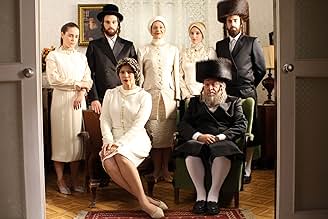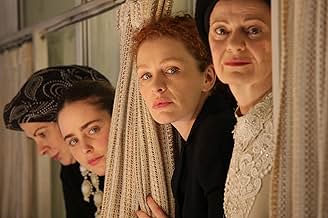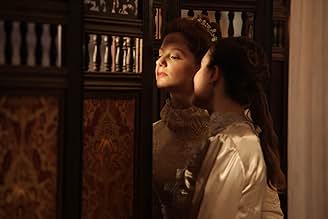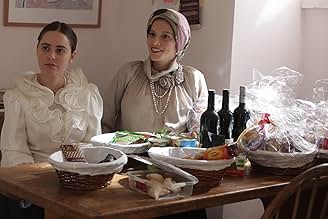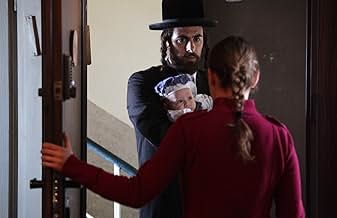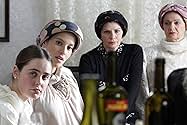NOTE IMDb
6,7/10
4 k
MA NOTE
Ajouter une intrigue dans votre langueWhen the older sister of Shira, an 18-year-old Hasidic Israeli, dies suddenly in childbirth, Shira must decide if she can and should marry her widowed brother-in-law, which also generates te... Tout lireWhen the older sister of Shira, an 18-year-old Hasidic Israeli, dies suddenly in childbirth, Shira must decide if she can and should marry her widowed brother-in-law, which also generates tensions within her extended family.When the older sister of Shira, an 18-year-old Hasidic Israeli, dies suddenly in childbirth, Shira must decide if she can and should marry her widowed brother-in-law, which also generates tensions within her extended family.
- Récompenses
- 14 victoires et 16 nominations au total
Avis à la une
Over the last dozen or so years, no less than seven films have been made about the orthodox religious community in Israel. These films are:
Forbidden Love (1999); Kadosh (1999); Bat Kol (Inner Voice) (2002); Ushpizin (2004); My Father, My Lord (2007); The Secrets (2007); Eyes Wide Open (2009).
All these films were made by non-religious or at least non-orthodox film makers, and then along came Fill the Void. Its director and scriptwriter, Rama Burshtein, is an orthodox woman who is also a film maker.
Which raises the question whether this new film is more authentic than the previous ones, whether it portrays the orthodox community more faithfully. It should be understood that the orthodox communities in Israel are tightly-knit units, abhorring the outside, modern Western way of life which they perceive as decadent, immoral and corruptive. They still dress as did their ancestors in the Shtetl in Eastern Europe centuries ago, talk mostly Yiddish among themselves and of course, inter-marry only within their milieu.
Fill the Void is indeed about this latter issue, the question of marriage. The questions raised by the protagonists may seem quaint and even amusing to us, but seem of paramount importance to them, as if no other issues occupy their closed life.
This reviewer has no way of assessing the veracity of the facts and can only rely on subjective impressions. The film "rings true", feels true, and the fact that some of the actors come from a religious background adds to the feeling. Viewers might sneer at the seemingly irrelevant questions facing those "strange" people, but the acting convincingly conveys the sentiment that we are indeed dealing with a grave situation.
I came out of the theater thinking not about the heroine, blandly played by Hila Feldman, or about the way she handles her private demons and dilemmas, but about the strange, foreign, incomprehensible community living not a mile away from my house in the same city, yet separated from me by an unbridgeable chasm.
A disturbing movie.
Forbidden Love (1999); Kadosh (1999); Bat Kol (Inner Voice) (2002); Ushpizin (2004); My Father, My Lord (2007); The Secrets (2007); Eyes Wide Open (2009).
All these films were made by non-religious or at least non-orthodox film makers, and then along came Fill the Void. Its director and scriptwriter, Rama Burshtein, is an orthodox woman who is also a film maker.
Which raises the question whether this new film is more authentic than the previous ones, whether it portrays the orthodox community more faithfully. It should be understood that the orthodox communities in Israel are tightly-knit units, abhorring the outside, modern Western way of life which they perceive as decadent, immoral and corruptive. They still dress as did their ancestors in the Shtetl in Eastern Europe centuries ago, talk mostly Yiddish among themselves and of course, inter-marry only within their milieu.
Fill the Void is indeed about this latter issue, the question of marriage. The questions raised by the protagonists may seem quaint and even amusing to us, but seem of paramount importance to them, as if no other issues occupy their closed life.
This reviewer has no way of assessing the veracity of the facts and can only rely on subjective impressions. The film "rings true", feels true, and the fact that some of the actors come from a religious background adds to the feeling. Viewers might sneer at the seemingly irrelevant questions facing those "strange" people, but the acting convincingly conveys the sentiment that we are indeed dealing with a grave situation.
I came out of the theater thinking not about the heroine, blandly played by Hila Feldman, or about the way she handles her private demons and dilemmas, but about the strange, foreign, incomprehensible community living not a mile away from my house in the same city, yet separated from me by an unbridgeable chasm.
A disturbing movie.
Israeli director Rama Burshtein's powerfully moving Fill the Void, Israel's submission to the 2012 Oscars, is about love and marriage but, in the Orthodox Hasidic community in Tel Aviv, they do not necessarily go together like a horse and carriage. Hadas Yaron, winner of the Best Actress Award at the Venice Film Festival in her first film role, is eighteen year-old Shira who is very close to being matched and promised to a local young man. When her older sister Esther (Renana Raz) dies in childbirth, however, her husband, the striking-looking Yochay (Yiftak Klein), is left to raise his young son Mordecai by himself and, according to tradition, has a duty to remarry once the formal mourning period is over.
This is where the film's central dilemma comes in and Shira's choice to "do the right thing" is severely tested by conflicting loyalties. After her family celebrates the Jewish holiday Purim, Shira and her mother, Rivka (Irit Sheleg) in a scene with Woody Allen overtones, are sent by the matchmaker to "shop" in the supermarket to find a suitable husband. When the right man is found, arrangements are made, even though Shira does not actually meet the young man until later in the film. When her mother learns that Yochay has a marriage offer from a widow living in Belgium, however, and cannot face the idea of the baby being taken away, she asks the matchmaker Mr. Shtreicher (Michael David Weigl) to arrange for Shira to marry Yochai, who is ten years older.
Fill the Void is a heartfelt and intimate look inside a world few of us ever have contact with. Sensitive to the orthodox community's rituals and traditions, however anachronistic they may seem to us, there is a feeling behind the rituals that binds people together and produces a feeling of closeness in the community, underscored by the rhythmic chants and joyous celebrations of special occasions. Though the purpose of every girl is to be married may seem offensive, in the culture in which it takes place, it is not demeaning, and the film does not stand in judgment of its characters or of the community.
As director Rama Buhrstein, a member of the Orthodox community herself, describes the film, "It's not about being an anthropologist or about religion or secularism. Rather, it's about the heart." Shira is asked to choose between her sense of duty to her family and community and her desire to fulfill her own dreams. Throughout the process, however, she is not alone and is always surrounded by love and support from mothers, fathers, aunts, rabbis, even though their advice may be conflicting. Her affectionate Aunt Hanna (Razia Israeli), who never married because of a disability, encourages Shira to do what is right for herself, putting her at odds with her mother.
Shira's older unwed cousin Frieda (Hila Feldman) tells her that it was Esther's wish that she marry Yochay if anything should happen to her, a proposition Yochay rebels at. Sensing Shira's confusion and uncertainty about marrying Yochay, however, the chief Rabbi (Melech Thal) refuses to bless the marriage. Even as many emotions seem to be happening all at the same time, the resolution of the conflict is poignant and even beautiful and it all comes together in a memorable final shot.
This is where the film's central dilemma comes in and Shira's choice to "do the right thing" is severely tested by conflicting loyalties. After her family celebrates the Jewish holiday Purim, Shira and her mother, Rivka (Irit Sheleg) in a scene with Woody Allen overtones, are sent by the matchmaker to "shop" in the supermarket to find a suitable husband. When the right man is found, arrangements are made, even though Shira does not actually meet the young man until later in the film. When her mother learns that Yochay has a marriage offer from a widow living in Belgium, however, and cannot face the idea of the baby being taken away, she asks the matchmaker Mr. Shtreicher (Michael David Weigl) to arrange for Shira to marry Yochai, who is ten years older.
Fill the Void is a heartfelt and intimate look inside a world few of us ever have contact with. Sensitive to the orthodox community's rituals and traditions, however anachronistic they may seem to us, there is a feeling behind the rituals that binds people together and produces a feeling of closeness in the community, underscored by the rhythmic chants and joyous celebrations of special occasions. Though the purpose of every girl is to be married may seem offensive, in the culture in which it takes place, it is not demeaning, and the film does not stand in judgment of its characters or of the community.
As director Rama Buhrstein, a member of the Orthodox community herself, describes the film, "It's not about being an anthropologist or about religion or secularism. Rather, it's about the heart." Shira is asked to choose between her sense of duty to her family and community and her desire to fulfill her own dreams. Throughout the process, however, she is not alone and is always surrounded by love and support from mothers, fathers, aunts, rabbis, even though their advice may be conflicting. Her affectionate Aunt Hanna (Razia Israeli), who never married because of a disability, encourages Shira to do what is right for herself, putting her at odds with her mother.
Shira's older unwed cousin Frieda (Hila Feldman) tells her that it was Esther's wish that she marry Yochay if anything should happen to her, a proposition Yochay rebels at. Sensing Shira's confusion and uncertainty about marrying Yochay, however, the chief Rabbi (Melech Thal) refuses to bless the marriage. Even as many emotions seem to be happening all at the same time, the resolution of the conflict is poignant and even beautiful and it all comes together in a memorable final shot.
Israel's official entry to the Oscars this year is probably too minimalistic and low-key to make it to the final five, but it's a film well worth watching and is in fact one of the best films I've seen so far emerge from the growing Israeli cinema. Fill the Void is of particular interest to Israeli viewers because it's a rare window into the very closed-community lifestyle of the Orthodox Jews, giving very rare insight as the film was made by an Orthodox director but with a secular audience in mind, which is something never seen before. For foreign viewers too, it may be a fascinating glimpse into an anachronistic, static religious community that hardly ever opens itself up like this to the general public.
Cinematically, Fill the Void is startlingly minimalistic; the story is a very brief glimpse into a very simple lifestyle. The gorgeous cinematography compliments that, constantly focusing on the contrast between Hadas Yaron's white face, the black clothing and the gray-brown backgrounds, but with a soft focus that makes it very easy to get lost inside. The cinematography itself is so aesthetic that it often conceals just how simple the story and the characters are - the film revolves around one moral question without giving too much insight into the thought processes of any of the characters. Its real achievement however is in enabling the viewer to be immersed in the environment and the lifestyle of a culture so different from what we're used to, and in that sense it's a triumph.
Cinematically, Fill the Void is startlingly minimalistic; the story is a very brief glimpse into a very simple lifestyle. The gorgeous cinematography compliments that, constantly focusing on the contrast between Hadas Yaron's white face, the black clothing and the gray-brown backgrounds, but with a soft focus that makes it very easy to get lost inside. The cinematography itself is so aesthetic that it often conceals just how simple the story and the characters are - the film revolves around one moral question without giving too much insight into the thought processes of any of the characters. Its real achievement however is in enabling the viewer to be immersed in the environment and the lifestyle of a culture so different from what we're used to, and in that sense it's a triumph.
Set in an orthodox Hasidic Jewish community in Tel Aviv, FILL THE VOID centers around eighteen-year-old Shira's (Haldas Yaron), decision about whether to marry widower Yochay (Yiftach Klein) or not. Yochay was already married to her sister Esther (Renana Raz), but sadly Esther passed away during childbirth. The title sums up the film's principal theme: by following her family's fishes, Shira will fill the void created by Esther's passing, and hence become a good mother to Esther and Yochay's newly-born son Mordecai. Morally speaking, she believes she is doing the right thing by accepting Yochay's offer, but director Rama Burshtein asks us to reflect on whether the decision will fill the void in Shira's life, or simply deepen it. Issues of love never seem to enter Shira's mind; she believes she is obliged to marry, and hence works hard to persuade the rabbi (Melech Thal) to sanction her decision. The film is tightly constructed as a series of close-ups and two-shots: the camera gives us a unique insight into Shira's turbulent state of mind, as she sits opposite Yochay, her head bowed, her lip quivering as she tries her best to maintain a facade of calm. Her family offer her a limited amount of support, but it's clear that they are forcing her into marriage. The only way she can obtain succor is to pray to God: in one sequence she is photographed from above, her eyes staring into the camera, as she tries to listen to His word. The ending is quite achingly poignant; in her wedding dress, Shira looks stunningly beautiful, but she cannot sit still. Her body repeatedly rocks from left to right, almost as if she is trying to lull herself into a trance- like state to cope with her forthcoming ordeal. Burshtein cuts to the wedding ceremony, where her head is covered with a white sheet; she is quite literally blinded to what follows, while the families celebrate. The film ends with the now-married couple alone after the ceremony has concluded. They stand at either end of the room and Shira stares blankly into space, underlining the irony inherent in the film's title. A low-key film, but totally compelling nonetheless.
As a watcher of many movies I often find myself bored at watching the same tired clichés recycled over and over and packaged as original movies.
Thats why i was refreshed to watch this movie- a film that has an original story and gives us a look at a different world.
I found the casting to be excellent. The male lead was strong & handsome and inhabited his role with controlled emotion and dignity. The female lead was beautiful in an innocent way and her demure manner and emotional expressions were well suited for her role.
Well done & thanks for a good film experience!
Thats why i was refreshed to watch this movie- a film that has an original story and gives us a look at a different world.
I found the casting to be excellent. The male lead was strong & handsome and inhabited his role with controlled emotion and dignity. The female lead was beautiful in an innocent way and her demure manner and emotional expressions were well suited for her role.
Well done & thanks for a good film experience!
Le saviez-vous
- AnecdotesHadas Yaron had to lie to get out of her military duty to audition for the film.
- ConnexionsFeatured in At the Movies: Venice Film Festival 2012 (2012)
- Bandes originalesIm Eshkachech Yerushalayim
(uncredited)
Meilleurs choix
Connectez-vous pour évaluer et suivre la liste de favoris afin de recevoir des recommandations personnalisées
- How long is Fill the Void?Alimenté par Alexa
Détails
Box-office
- Montant brut aux États-Unis et au Canada
- 1 775 316 $US
- Week-end de sortie aux États-Unis et au Canada
- 59 164 $US
- 26 mai 2013
- Montant brut mondial
- 3 197 615 $US
- Durée1 heure 30 minutes
- Couleur
- Mixage
- Rapport de forme
- 2.35 : 1
Contribuer à cette page
Suggérer une modification ou ajouter du contenu manquant

Lacune principale
By what name was Le coeur a ses raisons (2012) officially released in India in English?
Répondre






